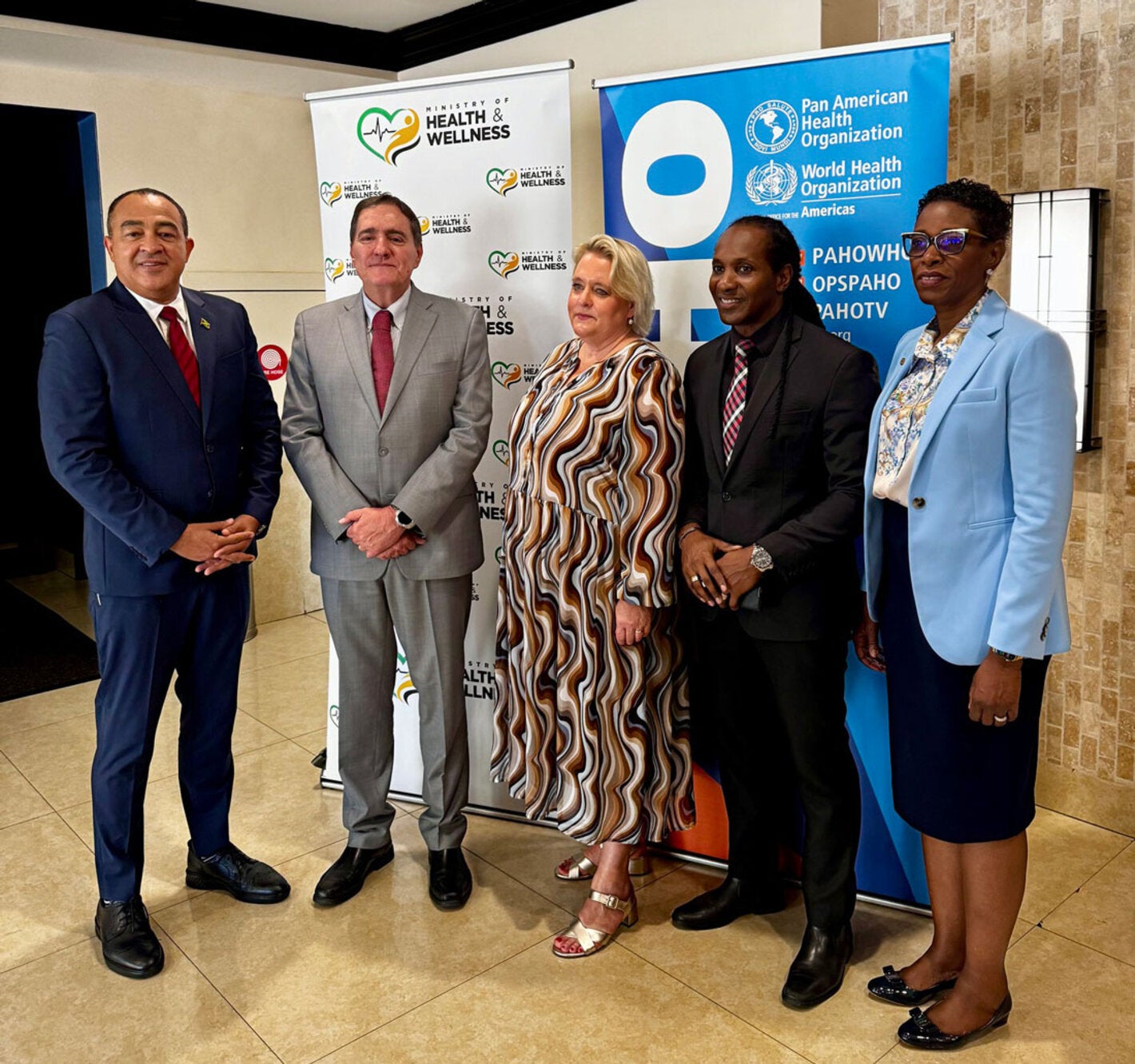
Kingston, 9 May 2024 (PAHO) - The Director of the Pan American Health Organization (PAHO), Dr. Jarbas Barbosa, concluded a visit to Jamaica this week marked by a series of engagements with senior government officials and international partners. The PAHO Director also attended the elimination of mother-to-child transmission of HIV and syphilis (EMTCT) certification ceremony for Jamaica, Belize, and St. Vincent and the Grenadines, as well as the certification ceremony of a baby-friendly hospital.
During the EMTCT ceremony, the Director congratulated all three countries for the public health milestone, noting that "this achievement is a testament to years of dedication, hard work, and collaboration among governments, health professionals, and communities." He expressed hope that the celebration would inspire other countries to reinvigorate their commitments towards a generation free of HIV and congenital syphilis. Putting an end to mother to child transmission of HIV and syphilis is one of the objectives of PAHO's Disease Elimination Initiative.
The Director traveled to the north of the island for the certification of St. Ann’s Bay Hospital as a baby-friendly hospital and was joined by the Minister of Health and Wellness, Dr. Christopher Tufton, and Ms. Olga Isaza, the Jamaica representative for UNICEF. The UNICEF and WHO Baby-Friendly Hospital certification was developed to encourage health facilities worldwide to better support breastfeeding.
In his remarks, Dr. Barbosa outlined the benefits of breastfeeding as a vital tool for infant health and development to help all children achieve their full potential. He also reinforced PAHO’s commitment to supporting Jamaica’s efforts to develop the necessary legislation so that the International Code of Marketing of Breast-Milk Substitutes can be monitored for infractions.
Dr. Barbosa’s trip also included a courtesy call with Dr. Horace Chang, Deputy Prime Minister of Jamaica. The discussions focused on cross-collaboration among different government ministries and the reinforcement of priority areas for attention in the context of Jamaica’s Health In All Policies, in which multiple ministries are required to ensure effective health-related advances.
The PAHO Director also met with Dr. Christopher Tufton, Minister of Health and Wellness, to explore avenues for health system support and collaboration. Subsequently, the Director attended Minister Tufton’s sectoral debate at Gordon House, which highlighted the achievements of the ministry during the last fiscal year and outlined plans and programs for approval from the House of Government.
Further engagements included discussions with representatives from the Inter-American Development Bank (IDB), focusing on primary health care reform and non-communicable disease prevention. Collaboration with international partners was emphasized in meetings with representatives from USAID and the High Commission of Canada in Jamaica. These discussions centered on current healthcare initiatives.
Additionally, the visit included a meeting with Mr. Dennis Zulu, UN Resident Coordinator, and Ms. Christine Stegling, Deputy Executive Director, Policy, Advocacy and Knowledge Branch, UNAIDS, to discuss the Multi-Country Sustainable Development Cooperation Framework for the English- and Dutch-speaking Caribbean. During this meeting, Dr. Barbosa reaffirmed PAHO’s commitment to helping achieve the 2030 agenda.
In his first visit to the Jamaica country office, Dr. Barbosa met with staff and engaged in discussions in which he reasserted his commitment to supporting all personnel. The visit allowed him to gain valuable insight from technical advisors who provided a brief overview of their areas.
Dr. Barbosa ended his visit by attending the premiere of the Ministry of Health and Wellness’ 'Dying Young’ docu-feature addressing the pressing issue of non-communicable diseases in Jamaica. In a panel discussion following the premiere, Dr. Barbosa commended the health ministry for making the issue of NCDs a priority and reaffirmed PAHO's commitment to improving population health outcomes by supporting initiatives targeting NCDs.



